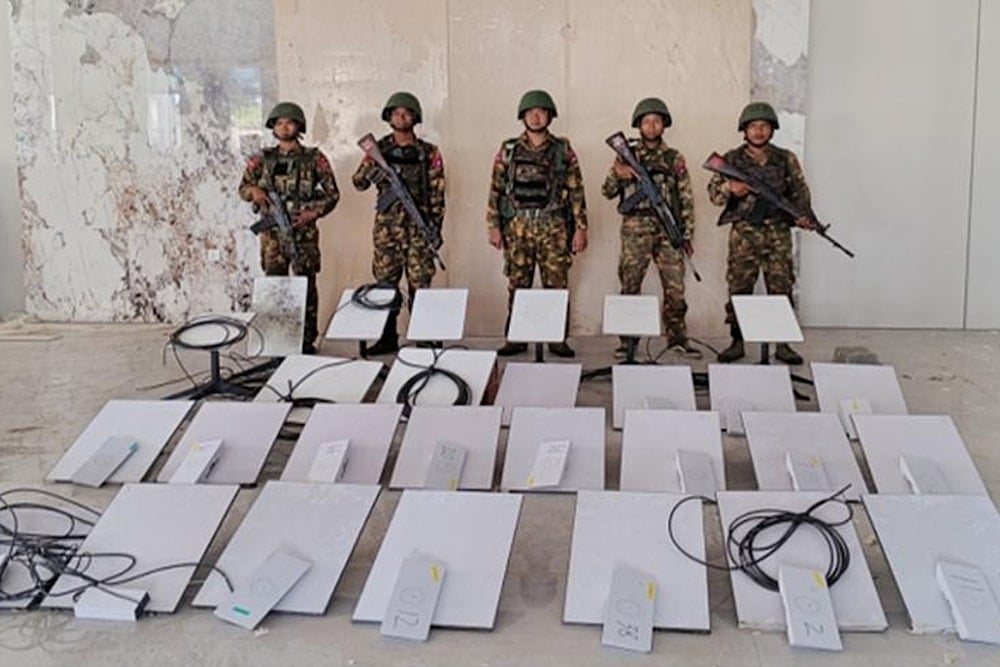SpaceX says 'disabled' 2,500 Starlink devices at Myanmar scam centers
SpaceX disables over 2,500 Starlink devices in Myanmar after reports reveal their use in online scam centers.
-

In this image provided by the Myanmar military on October 19, 2025, soldiers stand next to Starlink machines as they seize KK Park online scam center in Myawaddy township, Karen State, Myanmar. (The Myanmar Military True News Information Team via AP)
SpaceX has disabled more than 2,500 Starlink satellite internet devices operating in Myanmar’s scam compounds, the company said Wednesday, following revelations that the terminals were being used to power large-scale online fraud networks across the country’s lawless border zones.
The move came after an AFP investigation found a surge in Starlink installations at illicit centers in Myanmar’s northern territories, where criminal groups have run vast scamming operations targeting foreigners with fake investment, romance, and business schemes.
Lauren Dreyer, SpaceX’s vice-president of Starlink business operations, said in a post on X that the company had “disabled over 2,500 Starlink Kits in the vicinity of suspected ‘scam centers’” in Myanmar. Dreyer did not specify when the terminals were shut down, but said the decision followed mounting evidence of misuse.
SpaceX complies with local laws in all 150+ markets where @Starlink is licensed to operate. SpaceX continually works to identify violations of our Acceptable Use Policy and applicable law because - as with nearly all consumer electronics and services - the same technology that…
— Lauren Dreyer (@LaurenDreyer) October 22, 2025
Crackdown amid growing international pressure
Myanmar’s military junta announced this week that it raided KK Park, one of the country’s most notorious scam centres, and seized 30 Starlink terminals. AFP reporters, however, said that represented only a small fraction of those in use, estimating that hundreds more remained active at the site.
An AFP journalist on the ground saw more than 1,000 people fleeing the compound on foot, motorbikes, and pickup trucks as soldiers surrounded the area.
“Around 10:00 am, Myanmar military soldiers in four trucks arrived to our site,” one worker told AFP, requesting anonymity for security reasons.
The junta’s limited enforcement comes months after Thailand imposed a cross-border internet blockade and repatriated more than 7,000 workers earlier this year as part of a regional crackdown on scam syndicates.
Read more: Freed scam compound workers recount horrific abuse: The Guardian
Scam centers: A wartime economic engine
The scam compounds have become central to Myanmar’s wartime economy since the 2021 coup plunged the country into civil conflict. Many of the operations are run by militias aligned with the military, which allows them to operate in exchange for loyalty and revenue-sharing arrangements.
“They need to be able to enrich those militias,” said Nathan Ruser, an analyst at the Australian Strategic Policy Institute. “But then they also have the pressure from China.”
The result, he told AFP, is a “balancing act” in which the junta “tokenistically” enforces crackdowns, while actually not doing anything” to dismantle the broader criminal networks.
Beijing has been particularly vocal about the scam centers, where thousands of Chinese nationals have been trafficked, coerced, or defrauded. Earlier this year, Chinese officials led a regional campaign demanding stronger enforcement, leveraging their influence over Myanmar’s military government.
Read more: Cambodia apparently enabling cybercrime trafficking industry: Amnesty

 3 Min Read
3 Min Read








